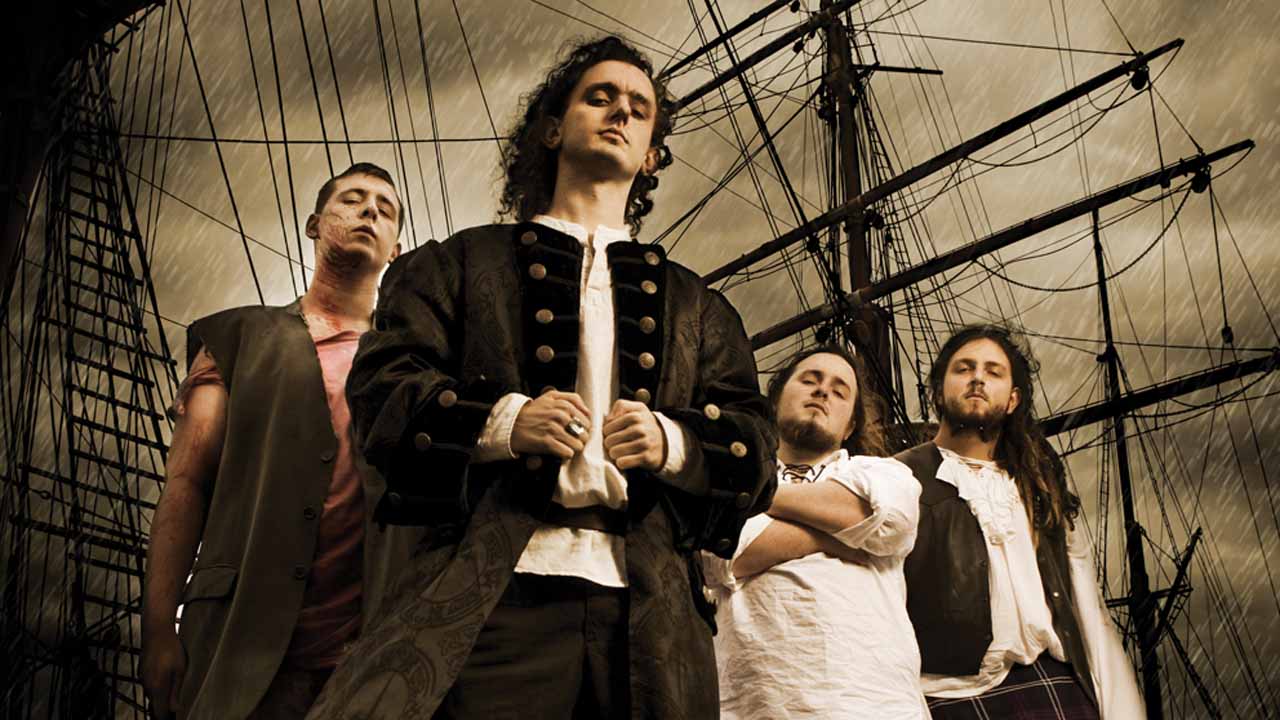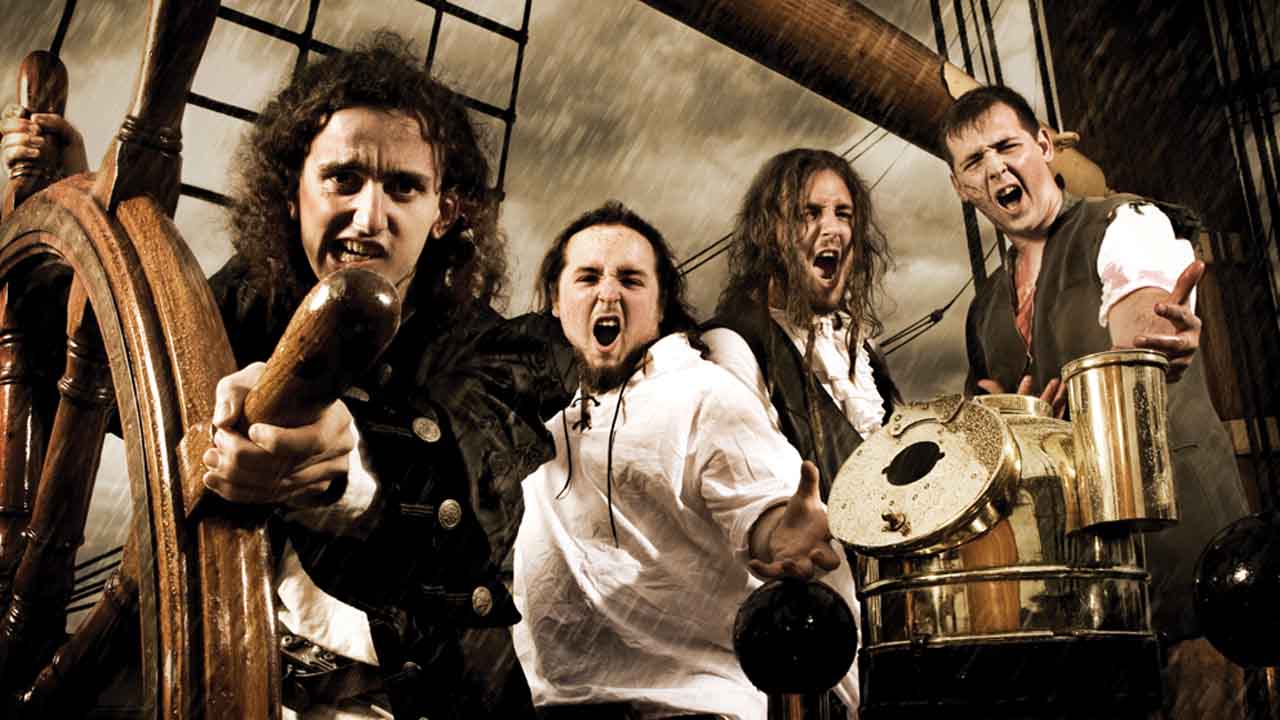Traditionally speaking, the UK has proven to be barren ground for power metal. The sub-genre’s spread throughout the 1980s represented a (near) global conquest as it moved from its origins in the US to climes as far flung as South America and Asia, but far as the UK was concerned, the rare homegrown band that did emerge could never compete with its continental counterparts. The hypersonic antics of Dragonforce went some way to finally establishing some kind of presence on the global power metal stage in the early 2000s, followed shortly behind by some Scots with a healthy appetite for drink and silly songs ready to make seismic waves of their own.
It all began with Heavy Metal Pirates, the song that launched a hundred ships – and one that didn’t even make the debut album. “I knew a bunch of guys who were in a band, so I wrote that song and sent it over to them,” says Alestorm vocalist Christopher Bowes. “They came back like, ‘Hey, would you like to join our band? We can write a bunch of songs about battles and sound like Rhapsody and shit!’ I turned up to the first rehearsal and asked what they had written. They were like, ‘Nothing!’ so I gave them my stupid song about pirates… before we knew, it every song was about pirates!”
- The best bluetooth speakers you can buy right now list
- On a budget? Here are the best budget turntables
- Spotify vs Apple Music vs Tidal: which streaming service is best for rock and metal?
- Best headphones for music: supercharge your music listening
Whimsical as this decision was, it proved to be a boon when it came to establishing the band’s own unique identity. Recording a couple of demos under the name Battleheart, the band sent them in to Austrian label Napalm Records (the label they still call home today) and were surprised at the response. “They came back and said, ‘These are great – do you want to record an album?’” Christopher says disbelievingly. “We’d barely done anything since recording the demos, so it was a bit of a surprise!”
With Napalm’s backing, the band – now rechristened Alestorm – set off for Lübeck, Germany to record their debut album with producer Lasse Lammert. “Our guitarist, Gavin [Harper], was a Children Of Bodom fanboy. He’d hang around on the forum, to the point where he started making a lot of connections through it,” explains Christopher. “One of them was Lasser – an aspiring producer who said, ‘I love this, if ever you make a record I’ll produce it.’ You know, these vague promises people will make… But then, we did!”
Despite their reputation for drinking songs and general party atmosphere, Christopher remembers the experience as being somewhat sparser than fans might imagine. “Spartan misery!” he laughs. “It was one of Lasser’s first records with a band, so when Gavin got there he ended up helping to build it! The studio was still bare concrete floors and we didn’t have the money or friends to go to parties or go crazy. The most we’d get was like £5 to go to a shop and buy a loaf, a big German sausage to cut up and some mayonnaise; we literally lived on that day to day!” That doesn’t mean the band didn’t have at least one vice, however… “We were obsessed with mead – folk metal dorks through and through! Mead was the vocal lubricant of choice: a tea that coats your throat.”

The two Battleheart demos formed the basis for much of the material that would make its way onto Alestorm’s debut record. Among these was an instrumental piece that served as a primordial base for the band’s breakthrough song.
“When we recorded those demos, the thinking was very much ‘Right, we play epic metal so our release needs to start with a two-minute orchestral piece, because that’s what epic metal bands do,’” Christopher says. “I hashed together this orchestral piece and called it The Curse Of Captain Morgan – because curses are very piratey. So there it was, an orchestral piece with a big, seafaring riff that sounds like it can be used for epic battles and that was that – it was a bit throwaway, really.”
With six or seven songs already written and demoed for the album, Alestorm only needed two or three new songs to complete their debut record. “We found ourselves going over that Curse Of Captain Morgan riff again and the song really started to develop from there,” Christopher explains. “Captain Morgan’s Revenge was put together from bits and pieces we hadn’t been able to use elsewhere – a bit of brain soup for whatever took our fancy!”
For a style so rooted in precision and technical prowess, Alestorm’s first major foray into the world of power metal was chaotic, to say the least. “Recording was weird because our drummer Ian [Wilson] couldn’t get to the studio,” Christopher says. “So we had a friend of Lasse’s – Migo Wagner – come in and go crazy. That insane drum fill that kicks it all off wasn’t in the original version of the song; even though it was totally out of time and all over the place we loved it, it sounded really progressive! He just played whatever he thought would sound great and it worked out incredibly well, as it gave this barbarian quality to the song.”
Perhaps it was this roughness that helped endear the band to the metal world on emergence. A case of lightning in a bottle (of rum?), Captain Morgan’s Revenge combined just the right elements to make the metal world take notice of the band.
“As far as epic Alestorm songs go, it’s the one, you know?” Christopher enthuses. “These days we’re known more for the dumb party songs, but people who know our more serious side would definitely point to Captain Morgan’s Revenge. Back in the days before everything went completely digital, it was the song that was sent out to all the magazines to feature on covermount CDs [including the Battle Metal VI compilation on the February 2008 edition of Metal Hammer – Archive Ed]. Nobody expected it to take off – the record company told us they’d be happy if it sold 3,000 copies in its lifetime and it sold over 10,000 in the first month; nobody knew it would be so good.”
The song certainly helped Alestorm land with a splash that soon turned into a wave the band could crest for much of 2008. The January release of the record was followed by their first ever tour supporting Turisas just a couple months later and a number of festival appearances that summer at spots like Graspop and Wacken.
“Wherever we went, people loved it,” Christopher says gleefully. “People were singing all the words to the songs, we just took it at face value and figured that’s how it was – people were going to turn up in their thousands and sing your songs. Our plan when we started was to write a few songs, play some local gigs and then call it a day… things just got out of control.”
That summer also finally gave the band a dose of debauchery that helped them live up to their reputation. They embarked up the River Thames to kick off proceedings aboard the HMS Hammer for the 2008 Golden Gods Awards, and followed it with a drinking session so Herculean it saw Christopher escorted from the bar (and away from a nonplussed Kerry King) – an impressive feat considering the Golden Gods generally gathers some of the most battle-hardened livers this side of a Motörhead gig.
“How decadent!” Christopher cackles. “We only had a 15-minute set, so had to do this really weird abridged version of the song, turning into a bit of a medley because we had to get to the bit where the song usually goes into this massive epic section and just… go into another song! We had no idea what was going on, but it was bonkers fun that I’ll never forget.”
Combining epic bombast and jaunty seafaring whimsy, Captain Morgan’s Revenge serves as a microcosm for exactly why fans love Alestorm in the first place and still endures as a staple of their live set even today. “We’ve cut most of the first album from the set because those songs aren’t really what our fans gravitate to now,” Christopher admits. “We’d sooner cut new songs than Captain Morgan’s Revenge because it’s still the song for our fans; it’s the song we can reliably build to in a set and say, ‘Right, we’re going to do a wall of death’ and know with absolute certainty that once that massive intro kicks in the fans are going to go insane.”
Far from being a flash in the pan gimmick, Captain Morgan’s Revenge shows Alestorm are a band with lasting appeal. Twelve years on from the release of their debut record, the band still pull the kinds of festival crowds even bands ostensibly bigger would kill for: rowdy, bawdy and ready to row (and sing) along to every word.

